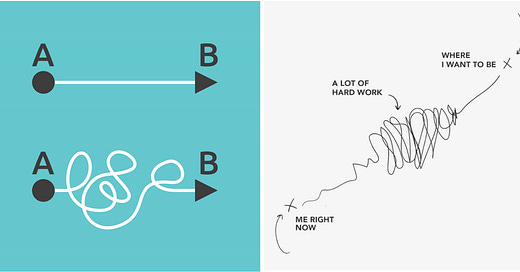“Do you know someone you would like to change and regulate and improve? Good! That is fine. I am all in favor of it. But why not begin on yourself? From a purely selfish standpoint, that is a lot more profitable than trying to improve others–yes, and a lot less dangerous.”1
I got into recruiting in 2010, when the economic recession was thoroughly underway in Los Angeles. To make ends meet, I had to walk to work uphill, in the snow both ways …Well, not really – it’s LA – but to build a book of business (and just stay solvent), it felt that way, since I was “borrowing” money in a draw-against-commission pay structure. My job was to call (yes, on the phone to landlines) CPAs and Financial Analysts who were in high demand. These candidates would whine to me about desired salaries in terms I just couldn’t appreciate: “I make $75K now, but I wouldn’t make a move for less than $85K” or “I need at least $150K to make ends meet.” These figures rang mockingly in my ears and I found it very easy to get caught up in a comparison - even the low end of their range was more than 2X what I lived on! It made me resentful both about my work and toward the candidates I was trying to place.
The antidote dawned on me one day: everyone has their own path, and it’s never straightforward. I eventually recognized that my issue about their compensation was actually my issue with my compensation. And it really, really, really, REALLY didn’t matter what their preferences were or how their priorities stacked up! It wasn’t my business to judge – or care – why anyone wants what they want; I only needed to understand them to do my job.
(Photo: Path from A to B2)
In recruiting there’s chances-a-plenty for FOMO like this - especially in technical or executive recruiting, where the compensation packages can be truly astronomical. Here’s an example: I was working to close (hire) a senior engineering leader at Big Company. When I finally uncovered the terms that this candidate was prepared to accept (which, in this case, included a $2 million stock package – I know!) I brought the proposed offer to my compensation partner. He said he could approve a stock package worth $1.8 million. To this, I was visibly frustrated, and he responded by saying, “I can’t believe you’re scoffing at $1.8 million!” And, it is true that I scoffed (OOPS!), my point – and I said this – was: “I, Bryce, am not scoffing at $1.8 million, I am scoffing because we just discussed what the candidate will accept, and it’s not that.”
Feedback accepted; I am working on my poker face.
Here’s the lesson: Separate yourself and your own processes from them and theirs. Define your authentic charter. Work that angle, and avoid comparison – it’s the thief of joy3. It’s also an unnecessary distraction: in comparison, you’re projecting yourself into someone else’s reality. This raises your self-centeredness (academically referred to as “self-orientation”4, more to come on this later) which decreases your ability to build trust, and ultimately lowers your effectiveness!
Standardized testing taught us we ought to seek to be best at everything. a.) that’s unnecessary, and b.) unreasonable. Nobody’s perfect5. Interviewing for jobs conditioned us to be ready to answer “what are your areas for improvement?” And while it’s important to have that self-awareness and be willing to improve where incentives support doing so, there’s thought-leadership from author Marcus Buckingham that suggests a mismatch in how we think about strengths and weaknesses: “You can grow incrementally in your areas of weakness, but research has proven you’ll grow exponentially in your areas of strength.”6
A dear and very smart friend refers to this as your “zone of genius.”7 Find and embrace – your zone(s) of genius! Knowing what you are best at can enable you to be more opportunistic about finding ways to trade on the qualities that make you uniquely great. After all, there’s a lid to every pot. So, do YOU!
HTWFAIP pg. 12
President Theodore Roosevelt
MW: concerned primarily with oneself and especially with one's own desires, needs, or interests
Recurring theme
Credit: Claire Vo Lawless



